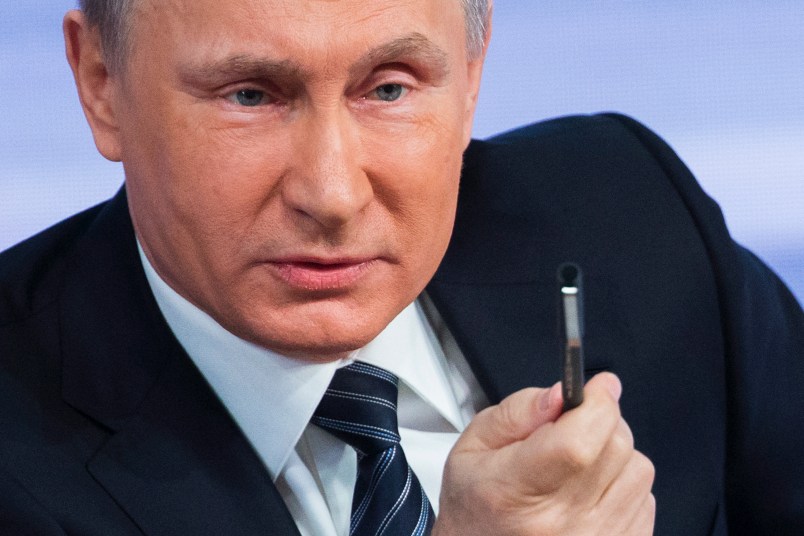WASHINGTON (AP) — Russia will ask permission on Monday to start flying surveillance planes equipped with high-powered digital cameras amid warnings from U.S. intelligence and military officials that such overflights help Moscow collect intelligence on the United States.
Russia and the United States are signatories to the Open Skies Treaty, which allows unarmed observation flights over the entire territory of all 34 member nations to foster transparency about military activity and help monitor arms control and other agreements. Senior intelligence and military officials, however, worry that Russia is taking advantage of technological advances to violate the spirit of the treaty.
Russia will formally ask the Open Skies Consultative Commission, based in Vienna, to be allowed to fly an aircraft equipped with high-tech sensors over the United States, according to a senior congressional staffer, who spoke on condition of anonymity because the staff member wasn’t authorized to discuss the issue publicly.
The request will put the Obama administration in the position of having to decide whether to let Russia use the high-powered equipment on its surveillance planes at a time when Moscow, according to the latest State Department compliance report, is failing to meet all its obligations under the treaty. And it comes at one of the most tension-filled times in U.S.-Russia relations since the end of the Cold War, with the two countries at odds over Russian activity in Ukraine and Syria.
“The treaty has become a critical component of Russia’s intelligence collection capability directed at the United States,” Adm. Cecil D. Haney, commander of the U.S. Strategic Command, wrote in a letter earlier this year to Rep. Mike Rogers, R-Ala., chairman of a House subcommittee on strategic forces.
“In addition to overflying military installations, Russian Open Skies flights can overfly and collect on Department of Defense and national security or national critical infrastructure,” Haney said. “The vulnerability exposed by exploitation of this data and costs of mitigation are increasingly difficult to characterize.”
A State Department official said Sunday that treaty nations had not yet received notice of the Russian request, but that certification of the Russian plane with a “digital electro-optical sensor” could not occur until this summer because the treaty requires a 120-day advance notification. The official spoke on condition of anonymity because he wasn’t authorized to discuss the issue publicly.
The official also said that the treaty, which was entered into force in 2002, establishes procedures for certifying digital sensors to confirm that they are compliant with treaty requirements. The official said all signatories to the treaty agree that “transition from film cameras to digital sensors is required for the long-term viability of the treaty.”
In December, Rose Gottemoeller, undersecretary of state for arms control and international security, sought to temper concerns about Russian overflights, saying that what Moscow gains from the observation flights is “incremental” to what they collect through other means.
“One of the advantages of the Open Skies Treaty is that information — imagery — that is taken is shared openly among all the treaty parties,” she said at a joint hearing of the House Foreign Affairs and Armed Services committees in December. “So one of the advantages with the Open Skies Treaty is that we know exactly what the Russians are imaging, because they must share the imagery with us.”
Still, military and intelligence officials have expressed serious concern.
“The open skies construct was designed for a different era,” Lt. Gen. Vincent Stewart, director of the Defense Intelligence Agency, told lawmakers when asked about the Russian overflights during a congressional hearing. “I’m very concerned about how it’s applied today.”
Robert Work, deputy secretary of defense, told Congress: “We think that they’re going beyond the original intent of the treaty and we continue to look at this very, very closely.”
Steve Rademaker, former assistant secretary of state for the bureau of arms control and the bureau of international security and nonproliferation, told Congress at a hearing on security cooperation in Europe in October that Russia complies with the Open Skies Treaty, but has “adopted a number of measures that are inconsistent with the spirt” of the accord.
The treaty, for instance, obligates each member to make all of its territory available for aerial observation, yet Russia has imposed restrictions on surveillance over Moscow and Chechnya and near Abkhazia and South Ossetia, he said. Russian restrictions also make it hard to conduct observation in the Kaliningrad enclave, said Rademaker, who believes Russia is “selectively implementing” the treaty “in a way that suits its interests.”
Copyright 2016 The Associated Press. All rights reserved. This material may not be published, broadcast, rewritten or redistributed.







I wish I had a ray gun that could make every voter understand the implications of situations like this. Somebody has to come up with an interdepartmental response to this that makes sense for the United States and the world as the years go on. And multiply this by God knows how many similar situations—hundreds and thousands. Leaders and the people they hire need experience, knowledge, and sound judgment. You can’t just grab somebody off the street because you think he’s funny or talks with grandiose assurance. I just wish I had a ray gun to make people understand. Or failing that, a real gun to just shoot them with.
The first sentence seems like one crafted to impart the obvious implications of such flyovers upon idiots.
Second, how does flying over with the latest in gadgetry violate either the spirit or the letter of the open skies agreement?
Because Russkies!!!
So Russia is basically demanding to be able to fly through US airspace with their own version of an AWAC. Am I the only person that sees a problem with this?
“The official also said that the treaty, which was entered into force in 2002.”
How long before the right claims that Obama did this?